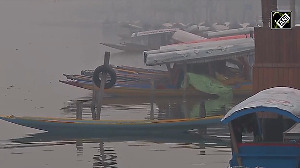An impressive 89.8 per cent of the over 25.73 lakh electors came out to vote in Tripura assembly elections, the Election Commission said. Earlier, based on details made available by local poll authorities, the commission had put the figure at 76 per cent.

The polling for 59 seats of the 60-member assembly was peaceful with thousands of central paramilitary forces fanning across the northeastern state.
There were reports of malfunctioning of Electronic Voting Machines at some polling stations which were rectified.
Polling could not be held in the Charilam constituency due to the death of Communist Party of India-Marxist candidate Ramendra Narayan Deb Barma last week. The constituency will go to polls on March 12.
The Election Commission said in New Delhi the updated polling percentage was complied from 41 of the 59 constituencies.
At its briefing earlier, the poll watchdog had put the figures at 74 per cent.
In the last assembly elections, the voter turnout was recorded at 91.82 per cent, while in the 2014 Lok Sabha polls, it was 84.32 per cent, Deputy Election Commissioner Sudip Jain told reporters in the national capital.

He said two crude bombs were detected and disposed of by security personnel.
The voter turnout is likely to rise as long queues were seen at polling stations even after 4 pm, the time for the voting to conclude. Under the electoral laws, voters standing in queue at the scheduled time for voting to conclude are allowed to exercise their franchise.
Additional CEO Tapas Roy said in Agartala initially there were problems with several EVM machines which were fixed.
Earlier in the day, Chief Electoral Officer Sriram Taranikanti had said voting was delayed in some polling booths of West Tripura, Khowai and Unakoti districts as officials could not properly connect the EVMs. Technicians were rushed in to these placed and EVMs set right.
The BJP, hitherto an “also ran” in the border state, has emerged as the key challenger to the CPI-M)-led Left Front, which has remained unvanquished in the last five assembly elections. Manik Sarkar, one of the most enduring icons of the CPI-M, has helmed the state for the last four terms.

The Congress, which has been marginalised in Tripura, was last in power between February 1988 and March 1993. It is contesting 59 seats and had not fielded candidate for Kakrabon constituency.
The BJP, which has been rapidly expanding its footprint in the northeast, with the party already in power in Assam, Manipur and Arunachal Pradesh, has forged an alliance with Indigenous People’s Front of Tripura, an anti-Left party.
The BJP has fielded candidates in 51 places, while its ally is contesting the remaining nine seats.
Prime Minister Narendra Modi and BJP chief Amit Shah spearheaded the BJP-IPFT challenge in one of the last bastions of the Left.

Sarkar, known for leading a frugal life and the considered the “poorest” of chief ministers in the country, almost single-handedly tried to defend his ‘Red fort’ against the saffron challenge.
Inspector General of Police (Law and Order) K V Srijesh said the voting was “incident free” and no violence was reported from anywhere.
While 300 companies of central armed forces were deployed, besides the state police, the BSF kept heightened vigil along the 856-km-long India-Bangladesh border in Tripura.

Director General of Indo-Tibetan Border Police R K Pachnanda was appointed special observer to coordinate with all security forces deployed for the election.
Manik Sarkar cast his vote in Ramnagar constituency, while Biplab Deb, the state BJP chief, pressed the EVM button in R K Pur seat in Gomati district. Tripura Congress president Birajit Sinha cast his vote at Kailashahar in Unakoti district.










